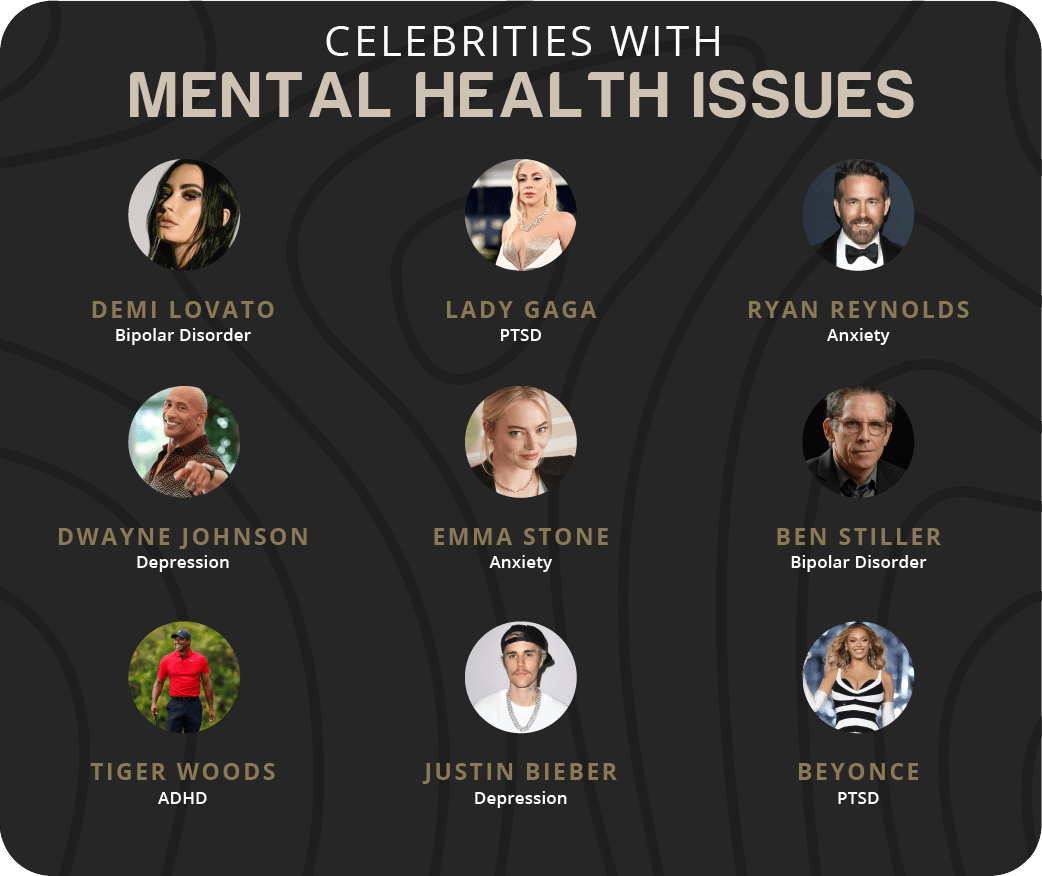Mental health issues affect people from all walks of life, including celebrities. Despite their fame and fortune, there are more celebrities with mental health issues than you might think. The public’s fascination with celebrity lifestyles can make it difficult for them to open up about their mental health issues.
However, many famous people with mental illness have used their platform to show the importance of seeking help for mental health. If you or a loved one is struggling with mental illness, get help at our treatment center in CA.
Why Do Celebrities Deal with Mental Health Issues?
Celebrities deal with mental health issues due to the following reasons:
-
Stress and Pressure: The entertainment industry is notoriously demanding, with intense pressure to perform and maintain a certain image. This constant stress can take a toll on an individual’s mental health.
-
Rejection and Criticism: Celebrities often face rejection in their careers and harsh criticism from the public and media. Such experiences can be emotionally taxing and lead to issues like anxiety and depression.
-
Lack of Privacy: The perpetual scrutiny and lack of privacy in their personal lives can also contribute to stress and anxiety, making it challenging for celebrities to find peace and solitude.
-
Role Strain: Playing characters with mental illness or those undergoing emotional turmoil can affect an actor’s mental well-being. The line between the character and the actor’s identity can sometimes blur, leading to emotional strain.
-
Physical Demands and Health Care Access: The physical demands of their roles, coupled with variable access to health care (due to erratic schedules and the nature of freelance work), can exacerbate mental health issues.
-
Substance Use: The availability of and sometimes the culture around substance use in the entertainment industry can lead to addiction issues, which are closely linked with mental health disorders.
-
Isolation: Despite being in the public eye, celebrities can experience isolation from real connections due to the nature of their work and the circles they move in. This isolation can lead to feelings of loneliness and depression.
15 Celebrities With Mental Health Issues
Demi Lovato has been open about her struggles with bipolar disorder since 2011. She has described having manic episodes, during which she would become reckless and engage in risky behavior. She also experienced depressive episodes in which she felt suicidal and had difficulty connecting with people.
Lovato sought help for her mental health issues by seeking professional therapy and attending rehabilitation centers. Through cognitive behavioral therapy (CBT), Demi has learned to better manage her symptoms. She has also engaged in self-care activities such as yoga, meditation, and other forms of exercise that can help stabilize her moods.
Lady Gaga has talked openly about her battle with post-traumatic stress disorder (PTSD). She has revealed that she was raped at the age of 19 and that this traumatic experience caused her to develop PTSD, which she has been living with for the past 10 years.
In 2016, Lady Gaga decided to get help for her PTSD, going public with her struggles and seeking out long-term treatment. As part of her treatment, she spoke openly about her experiences during various interviews and press conferences. She also sought out therapy and used self-care techniques such as yoga and meditation to help manage her symptoms.
Ryan Reynolds has struggled with anxiety since his teenage years. He attributes the onset of this anxiety to the fame and success that he achieved in his acting career. He found it difficult to cope with the added attention and scrutiny that came along with being in the public eye.
To help him manage his anxiety, Ryan began seeing a therapist and was prescribed medication. He also credits journaling, meditation, yoga, exercise, and breathwork as other strategies to help him stay grounded and calm.
Dwayne Johnson has openly discussed his lifelong struggle with depression. He experienced his first bout of depression at the age of 15 after his mother attempted suicide. Johnson reached out for professional help from a psychologist and psychotherapist, as well as support from family and friends.
He credits therapy sessions with helping him develop strong coping strategies and tools to deal with his depression and anxiety. Johnson also works out regularly as a form of self-care, which helps him stay physically and mentally healthy.
Emma Stone has been open about her struggles with anxiety, which began when she was a young child. She started having panic attacks at the age of seven and found it difficult to leave the house or do regular activities like going to school. Despite her efforts to manage her anxiety, it wasn’t until she was 15 that she realized there was mental health treatment available to help with her condition.
With the help of a therapist and medication, she learned helpful coping skills and techniques to manage her anxiety symptoms. She also credits mindfulness meditation as an important tool in managing her stress levels and feelings of anxiousness.
Justin Bieber’s struggle with depression began when he was young. He faced constant ridicule from his peers due to his rising fame and fortune. As a result of this, he suffered from low self-esteem and depression. For years, Justin struggled to cope and deal with these issues but they eventually took a toll on his mental health.
Fortunately, Justin was able to get the help he needed by seeking treatment from both medical professionals and spiritual advisors alike. In addition to counseling, Justin also made changes in his life that allowed him to take better care of himself such as getting more restful sleep, eating healthier foods, and practicing mindfulness.
Selena Gomez has been open about struggling with mental health issues throughout her career. In 2017, she revealed that she had been diagnosed with lupus and underwent a kidney transplant as part of her treatment plan. Gomez also suffered from depression and anxiety due to the disease.
Gomez has since become an advocate for mental health awareness, encouraging anyone who needs help to reach out and seek professional assistance. She launched the Selena Gomez Fund for Mental Health Awareness in 2019 to provide financial assistance to organizations working towards improving mental healthcare access and resources.
Beyoncé has discussed her struggles with Post-Traumatic Stress Disorder (PTSD) in various interviews and lyrics. Beyoncé sought help for her PTSD by visiting a therapist to talk through her problems and learn how to cope with them.
Through trauma therapy sessions, Beyoncé has been able to gain insight into her mental state and develop healthier coping strategies. She also practices self-care exercises such as yoga, journaling, and meditation to manage her symptoms.
Kristen Bell has been open and honest about her struggles with anxiety and depression. She has said in interviews that she was diagnosed with both when she was 18 years old and that it has been a lifelong journey. She also admits that the strain of being a public figure often creates additional pressure for her.
Bell has found various ways to manage her mental health, such as therapy, medication, exercise, and self-care practices. Another major component of her support system is the ongoing dialogue she maintains around mental health. Bell frequently shares her experiences with her followers on social media, emphasizing the importance of seeking help and taking care of yourself.
Tiger Woods has struggled with Attention Deficit Hyperactivity Disorder (ADHD) throughout his life. He was diagnosed at a young age and has spoken publicly about his struggles. Tiger’s father, Earl Woods, implemented a rigorous practice and training regimen to help manage his son’s symptoms, which included long hours in the gym and extended tutoring sessions to help improve concentration.
In more recent years, Tiger has made lifestyle changes that have also helped him better manage his ADHD symptoms. He also enlisted the aid of a sports psychologist to help him further control his thoughts, emotions, and impulses.
Ozzy Osbourne has struggled with bipolar disorder for most of his life. He was first diagnosed in the 1980s, and since then he has experienced episodes of depression, anxiety, and mania. During his manic episodes, Osbourne has exhibited aggression, impulsiveness, and other symptoms associated with the disorder.
Osbourne has sought help to manage his bipolar disorder through various means. He started attending 12-step meetings and working closely with a support system to help him maintain his mental health. Additionally, Osbourne changed his lifestyle by exercising regularly, avoiding drugs and alcohol abuse, and practicing meditative activities.
Britney Spears has been publicly struggling with bipolar disorder since her diagnosis in 2007. She experienced a series of mental health crises, including two stays in psychiatric hospitals. In 2008, she was placed under temporary court-ordered guardianship due to issues related to her mental health.
In the years since then, Britney has tried various methods of treatment for her disorder, such as therapy and lifestyle changes. She also regularly takes medications prescribed by doctors to help manage her symptoms and maintain her stability.
Billy Joel struggled with depression for a long time before he sought help. He has spoken openly about his condition, saying that it began at an early age and only got worse as he grew older. According to Joel, he often felt like life was meaningless and that there was no point in living.
In the late 1980s, Billy Joel finally decided to seek professional help for his depression. He entered a psychiatric hospital near Los Angeles and underwent a series of treatments including both medication and therapy programs. Through this process, he was able to better understand his own emotions and eventually manage his depression more effectively.
Ben Stiller has been open about his struggles with bipolar disorder, which he was diagnosed with in the late 1990s. He has said that he went through a period of extreme highs and lows before seeking help. During his highs, he felt invincible but during his lows, he felt completely hopeless.
Stiller sought counseling from a mental health professional and began to take medication for his condition. With treatment, Stiller is now able to manage his symptoms and lead a successful life both professionally and personally.
John Daly’s struggle with bipolar disorder began in the late 1990s when he experienced an episode of depression. He was eventually diagnosed with Bipolar I disorder, a type of mental illness characterized by extreme changes in mood, energy, and activity levels. Daly had to manage his condition through medication and therapy as well as making lifestyle changes.
Once he accepted his diagnosis, Daly sought help from medical professionals who helped him develop strategies for managing his symptoms. He began seeing a psychiatrist regularly for counseling and adhering to a healthy lifestyle to better balance the highs and lows of bipolar disorder
Dual Diagnosis Program For Mental Health Issues
A dual diagnosis treatment program can help treat mental health issues by integrating both physical and mental health services, such as individual counseling, group therapy, medication management, and case management.
This holistic approach to treating mental health issues provides an effective way to identify both the underlying mental health problems. By incorporating multiple levels of care during the treatment process, a dual diagnosis program can provide greater insight into how to best address the patient’s needs.
This type of treatment often results in improved outcomes for those struggling with both mental health issues.
Westwind Recovery® Can Assist You With Mental Health Issues
Here at Westwind Recovery®, we are committed to providing our clients with high-quality, individualized care. Our programs help patients overcome mental illness through a wide range of treatment and therapy options. We want to make recovery as easy as possible so that you can achieve sober living and improved quality of life.
Contact us if you or a loved one could benefit from our services. We are here to help you break free from the hold of mental illness today.

Dr. Deena is the Chief Clinical Officer of Westwind Recovery®, an award-winning outpatient treatment center in Los Angeles where she oversees the clinical and administrative program and treatment methods. Dr. Deena is a doctor of psychology and licensed clinical social worker since 1993. LCSW #20628. Originally from the East Coast, Dr. Deena has worked running treatment centers, worked as a therapist in psychiatric hospitals as well as school settings and currently has a thriving private practice in the LA area. Dr. Deena has appeared regularly on the Dr. Phil Show as an expert since 2003. She has also been featured on many other TV shows, podcasts and has contributed to written publications as well as podcasts.





